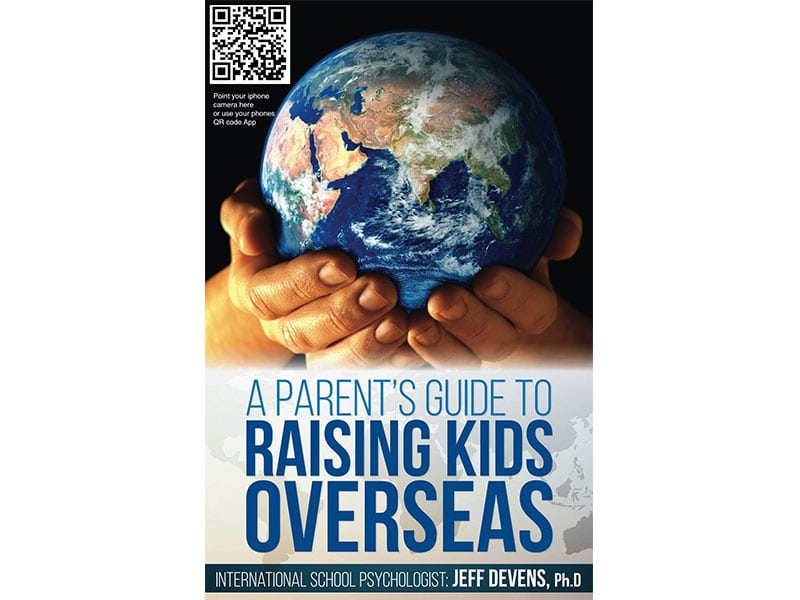Let’s face it: parenting is tough, whatever your situation. There’s a constant need to make complex judgement calls about what is best for your child. Being an expat adds another dimension to that equation. International school psychologist Dr Jeff Devens understands this as an expat parent himself, and has drawn on his professional and personal experiences to write a book on the subject.

Tell us a bit about yourself.
I’m originally from the US but have spent most of my adulthood overseas; we’ve lived in China, Saudi Arabia and, most recently, Singapore. For the past 22 years, I’ve worked in international education as a school psychologist, counsellor and classroom educator. In 2006, I completed a PhD in School Psychology – my dissertation research focused on depression rates among Third Culture Kids (TCKs). This past December, I published my first book, entitled A Parent’s Guide to Raising Kids Overseas. My wife Nanette and I have two Third Culture Kids (TCKs), Cylas (age 13) and Cora (9). We’re loving the parenting journey!
What led you to write your book?
Very little has been written about the day-to-day experiences parents face when raising kids abroad. My aim in writing this book is to provide real-life, “in the trenches” experiences I’ve encountered during my time working internationally with students and families. I wanted to write something that was practical, authentic and reflective of the realities parents will encounter when raising kids overseas.
Sometimes, the tendency is to glamorise the international experience. To be sure, there are unique aspects of living abroad, and these do change one’s outlook on life. This noted, there is still the day-to-day of practical parenting to be done.
What do you think are the biggest concerns parents have when raising children as expats?
Will my family be safe? How will transitions affect my child’s life? Have we made the right decision moving to this new location? Will our children receive a “good” education? Will they get into a “good” school? Have we caused irreparable harm to our kids by moving abroad? What do I do about our cultural values in the context of our current culture? Am I raising entitled kids? How do we maintain our parenting values in the context of differing beliefs? How do I parent when my partner is gone so frequently? These and a host of other questions are common concerns noted by parents.
Are these concerns justified?
Absolutely. Parents often don’t give weighted thought to these questions until they arrive. Once here, and the honeymoon period fades (typically lasting three minutes to three months) they’re faced with many practicalities and realities of parenting. Without answers to these questions, parents become anxious (naturally so) and this permeates into their parenting, resulting in anxious kids.
What do you think are the biggest impacts on a child being raised as an expat?
Kids growing up overseas are presented with many wonderful life experiences that impact their view of themselves and their place in the world. Many of these kids become Third Culture Adults (TCAs), continuing their work abroad just as they did when they were children. For others, the desire is to plant deep roots and not venture far from “home”. Most of the kids I’ve worked with realise that home isn’t so much about geography. Instead, it’s rooted in shared experiences with others. It’s these experiences that provide them with a unique life perspective.
What are the biggest challenges for families when living as expats?
The biggest challenges parents encounter when living as expats include long working hours, frequent parent/partner separations due to extended travel, and loss of community. Expat life, in some respects, isn’t what many parents thought it would be. At times, marriages are put under tremendous stress, with one partner gone for long periods of time. Often this results in guilt or resentment, both terrible motivators for parenting. Parents need to understand what they are committing to when they sign contracts. Once signed, it’s about supporting one another and the work they’re both doing until the next contract period.
Far too often, I’ve witnessed parents chase the golden handcuffs of the expat package, climbing the ladder, all under the pretence that this is beneficial for the family. Sometimes, the best choice is to not take that promotion knowing it will “cost” additional hours away from home. International living can result in a loss of community. Schools often act as the hub of the community, providing supports and structures helping parents and kids connect with others in similar stages of life. This can be a wonderfully enriching experience or it can feel like living in a fishbowl! Expat families will also need supportive networks of other parents and caring adults in their kids’ lives. The influence of loving, caring adults will need to be provided by those in the extended international community.
What do you think of the Third Culture Kid concept? Does being raised in a different culture have a lasting impact on a child?
By design, our travels and childhood experiences will impact who we become as adults. Being raised in a different culture (sometimes many cultures) and then attempting to assimilate parts of these into one another can be challenging and rewarding. The Third Culture Kids I’ve had the privilege of working with view the world, and their place in it, in wonderful ways.
A Parent’s Guide to Raising Kids Overseas is available on Amazon and Kindle.
See more in our Kids section!





